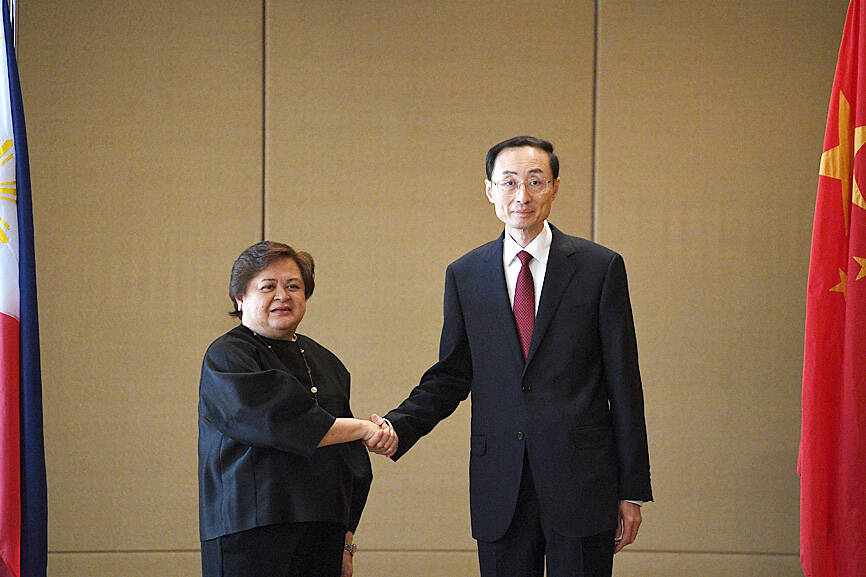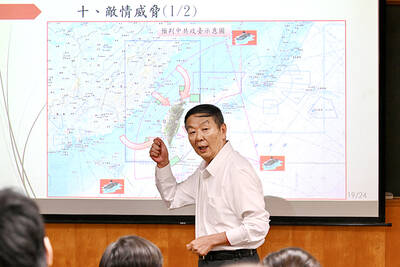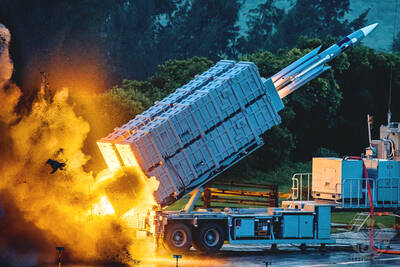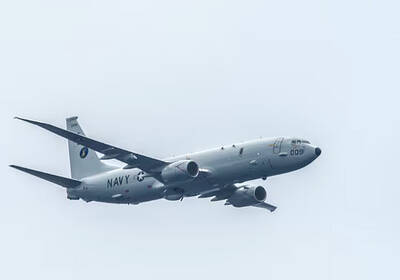Senior Chinese and Philippine diplomats yesterday met in Manila to review their relations amid thorny issues, including Beijing’s alarm over a Philippine decision to allow the US military to expand its presence to a northern region facing the Taiwan Strait and escalating spats in the South China Sea.
Chinese Vice Minister of Foreign Affairs Sun Weidong (孫衛東) and Philippine Undersecretary of Foreign Affairs Theresa Lazaro were leading the talks aimed at assessing overall relations.
The discussions were to focus on the long-seething territorial spats in the disputed waterway, the US Department of Foreign Affairs in Manila said.

Photo: EPA
The meetings are the first under Philippine President Ferdinand Marcos Jr, who took office in June last year.
He met Chinese President Xi Jinping (習近平) in a state visit to Beijing in January, when both agreed to expand ties, pursue talks on potential joint oil and gas exploration, and manage territorial disputes amicably.
However, the territorial conflicts have persisted as a major irritant in relations early in the six-year term of Marcos, whose administration has filed at least 77 of more than 200 diplomatic protests by the Philippines against China’s increasingly assertive actions in the disputed waters since last year.
That included a Feb. 6 incident when a Chinese Coast Guard ship aimed a military-grade laser that briefly blinded some crew members of a Philippine patrol vessel off a disputed shoal.
Marcos summoned the Chinese ambassador to Manila to express concern over the incident, but Beijing said the Philippine vessel intruded into Chinese territorial waters and its coast guard used a harmless laser to monitor the vessel.
Early last month, the Marcos administration announced it would allow rotating batches of US forces to indefinitely station in four more Philippine military camps. Those are in addition to five local bases earlier designated under a 2014 defense pact between the treaty allies.
Marcos on Wednesday said the four new military sites would include areas in the northern Philippines. That location has infuriated Chinese officials, as it would provide US forces a staging ground close to southern China and Taiwan.
The US would also have access to military areas on the western Philippine island province of Palawan, Marcos said, adding that the US military presence under the 2014 Enhanced Defense Cooperation Agreement was aimed at boosting coastal defense.
Palawan faces the South China Sea, which Beijing claims virtually in its entirety, but a UN-backed arbitration tribunal ruled in 2016 that historical claim had no legal basis under the 1982 UN Convention on the Law of the Seas.
China had dismissed the ruling, which Washington and other Western governments recognize, and continues to defy it.
Defense cooperation between countries “needs to be conducive to regional peace and stability, and not targeted at or harmful to the interests of any third party,” Chinese Ministry of Foreign Affairs spokesman Wang Wenbin (汪文斌) told reporters in Beijing on Wednesday.
Countries in the region should “remain vigilant and avoid being coerced or used by the US,” Wang said, without naming the Philippines.
A statement issued by the Chinese embassy in Manila was more blunt and warned that the Philippines’ security cooperation with Washington “will drag the Philippines into the abyss of geopolitical strife and damage its economic development at the end of the day.”

RETHINK? The defense ministry and Navy Command Headquarters could take over the indigenous submarine project and change its production timeline, a source said Admiral Huang Shu-kuang’s (黃曙光) resignation as head of the Indigenous Submarine Program and as a member of the National Security Council could affect the production of submarines, a source said yesterday. Huang in a statement last night said he had decided to resign due to national security concerns while expressing the hope that it would put a stop to political wrangling that only undermines the advancement of the nation’s defense capabilities. Taiwan People’s Party Legislator Vivian Huang (黃珊珊) yesterday said that the admiral, her older brother, felt it was time for him to step down and that he had completed what he

Taiwan has experienced its most significant improvement in the QS World University Rankings by Subject, data provided on Sunday by international higher education analyst Quacquarelli Symonds (QS) showed. Compared with last year’s edition of the rankings, which measure academic excellence and influence, Taiwanese universities made great improvements in the H Index metric, which evaluates research productivity and its impact, with a notable 30 percent increase overall, QS said. Taiwanese universities also made notable progress in the Citations per Paper metric, which measures the impact of research, achieving a 13 percent increase. Taiwanese universities gained 10 percent in Academic Reputation, but declined 18 percent

UNDER DISCUSSION: The combatant command would integrate fast attack boat and anti-ship missile groups to defend waters closest to the coastline, a source said The military could establish a new combatant command as early as 2026, which would be tasked with defending Taiwan’s territorial waters 24 nautical miles (44.4km) from the nation’s coastline, a source familiar with the matter said yesterday. The new command, which would fall under the Naval Command Headquarters, would be led by a vice admiral and integrate existing fast attack boat and anti-ship missile groups, along with the Naval Maritime Surveillance and Reconnaissance Command, said the source, who asked to remain anonymous. It could be launched by 2026, but details are being discussed and no final timetable has been announced, the source

CHINA REACTS: The patrol and reconnaissance plane ‘transited the Taiwan Strait in international airspace,’ the 7th Fleet said, while Taipei said it saw nothing unusual The US 7th Fleet yesterday said that a US Navy P-8A Poseidon flew through the Taiwan Strait, a day after US and Chinese defense heads held their first talks since November 2022 in an effort to reduce regional tensions. The patrol and reconnaissance plane “transited the Taiwan Strait in international airspace,” the 7th Fleet said in a news release. “By operating within the Taiwan Strait in accordance with international law, the United States upholds the navigational rights and freedoms of all nations.” In a separate statement, the Ministry of National Defense said that it monitored nearby waters and airspace as the aircraft